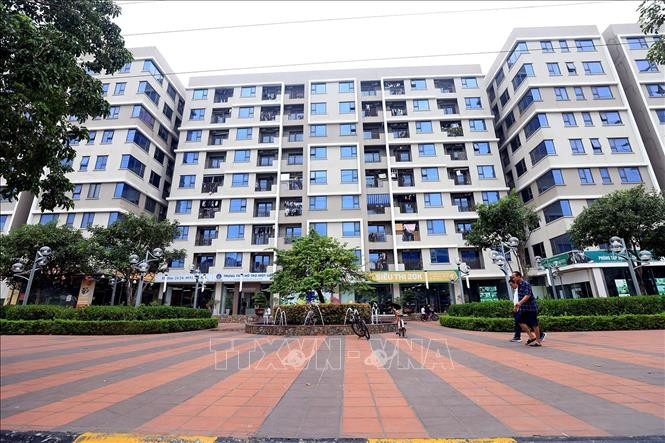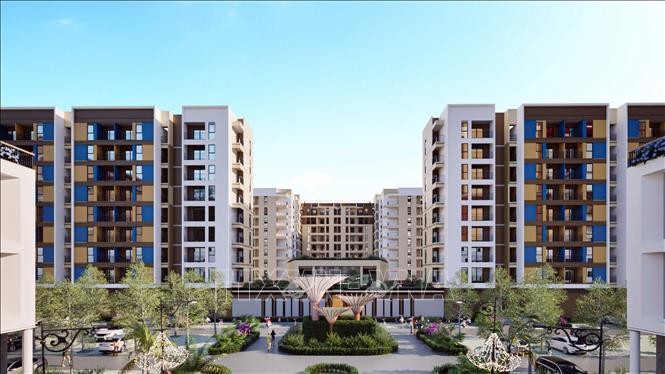
The Prime Minister's issuance of Decision No. 444/QD-TTg assigning the target of developing nearly 1 million apartments from now until 2030 shows that the policy of developing social housing is an indispensable part of the national socio -economic development plan. Not only stopping at the goal of providing housing for low-income people, social housing is also a deeply humane economic policy, contributing to expanding growth space, activating investment capital flows, creating jobs and promoting the healthy development of the real estate market.
Systemic effort
At the 9th extraordinary session of the 15th National Assembly , delegates conveyed the message that voters and people highly appreciated the Prime Minister's decision to assign targets for completing social housing in 2025 and the following years until 2030, and at the same time expected that in the coming time, the development of social housing will achieve the expected results, promoting the development of real estate projects, meeting the housing needs of the people.
In recent years, social housing has received deep and widespread attention. On May 24, 2024, the Central Executive Committee issued Directive 34-CT/TW, aiming to strengthen the Party's leadership role in social housing development, setting out important orientations and policies to shape the market.
The Prime Minister has organized many conferences to remove difficulties and obstacles, promoting the development of social housing. The Prime Minister's determination in management is clearly shown in Decision No. 444/QD-TTg dated February 27, 2025, assigning targets for completing social housing in 2025 and the following years until 2030 for localities to add to the socio-economic development targets. Accordingly, the social housing target that localities must complete in the 2025 - 2030 period is 995,445 apartments.
According to Dr. Hoang Van Cuong - a delegate of the 15th National Assembly, Decision No. 444 shows a positive shift from the previous passive development model - which was less attractive than commercial real estate - to a more proactive mechanism. This policy contributes to creating conditions for stakeholders; including businesses, banks and people to proactively mobilize capital and make investment plans.
In addition, perfecting the legal system for housing development has created favorable conditions for social housing projects, building a solid foundation for the next phase. Specifically, the Housing Law 2023, the Real Estate Business Law 2023 and the Land Law 2024 are built with special incentive mechanisms such as exemption of rent, land use fees and priority planning, while reducing complicated administrative procedures... The changes have expanded the target audience, making it easier for people to buy or rent social housing.
Dr. Can Van Luc - Chief Economist of BIDV and Member of the National Financial and Monetary Policy Advisory Council commented that the supply of social housing has grown impressively in 2024. Accordingly, the whole country has completed 28 projects with a scale of more than 20,000 apartments, an increase of about 46% compared to the previous year. The upcoming outlook will be brighter when support policies and difficulties for the real estate market begin to take effect.
Cutting 30% of administrative procedures and shortening the time for processing documents as directed by the General Secretary and Prime Minister is an essential step to remove obstacles in the project implementation process. At the same time, with the spirit of strong reform of administrative procedures, development of the private economy, digital transformation and promotion of the application of science and technology, confidence in the recovery and development of social housing is further strengthened.
At the same time, the economic growth target of 8% in 2025 and aiming for over 10% for the 2026-2030 period promises to create a favorable environment for the sustainable development of the social housing market, contributing to improving people's lives - Mr. Luc analyzed.
Identify the challenge
Social housing development is receiving attention from both the political system and the whole society, and has achieved initial results. However, besides these advances, there are still many barriers and obstacles in the implementation process, causing the achieved figures to be far from the expected target. Challenges have also been identified and require comprehensive solutions to solve this problem. These are land funds, capital sources, administrative procedures and lack of efforts...
According to Deputy Minister of Construction Nguyen Van Sinh, the country has planned 1,309 locations with a scale of 9,737 hectares of land for social housing. Most localities have reserved enough land for social housing development; even reserved favorable land locations, near urban centers, industrial parks, ensuring technical and social infrastructure requirements.
However, there are still places where the land fund arrangement is not commensurate with actual demand. Notably, some localities have a situation where investors of commercial housing projects have proposed the Provincial People's Committee to allow the conversion of the 20% land fund arrangement for social housing to the form of payment in cash, which may affect the land fund for the development of this housing segment.
At the same time, the preparation and approval of specific implementation plans for investment in social housing projects for each year and each phase from now until 2030 to ensure local needs are met is still very slow, although this is the responsibility of the provincial People's Committee - Deputy Minister Nguyen Van Sinh said.
In addition, the profit factor is also a major obstacle that makes businesses not "interested" in participating in social housing development. Mr. Le Huu Nghia - Director of Le Thanh Construction and Trading Company Limited shared that with the current prescribed profit rate of only 10% for social housing, after deducting expenses during 5 years of implementing a project, the actual number that businesses earn is only about 2%. Thus, it is not attractive enough for businesses to reinvest.
Mr. Le Hoang Chau, Chairman of the Ho Chi Minh City Real Estate Association (HoREA), also said that currently, one of the biggest barriers to social housing is low profits, which makes businesses not "interested" in investing. Only when the profit level is raised reasonably (about 13% according to the latest proposal being calculated by the Ministry of Construction) will more businesses be motivated to participate. From there, it will help increase supply, reduce the shortage of housing for low-income people. On the other hand, increasing profits also helps investors have more financial resources to reinvest, speed up construction progress, limit delays and help people access housing soon.
For social housing to develop sustainably, there needs to be synchronous solutions, including removing procedural and mechanism barriers to create more favorable conditions for businesses in the project implementation process.
From determination to action
Housing for the people is always a concern of the leaders of the Party, State and Government. Recently, at a working session with the Central Policy and Strategy Committee on economic growth targets, General Secretary To Lam mentioned that one of the solutions to boost the economy is that the operator needs to have land and real estate policies to help the market increase transactions, attract capital, and promote urban areas to become the driving force of national growth.
To do this, General Secretary To Lam mentioned the establishment of a "National Housing Fund" to develop low-cost housing in large cities. This is also one of the solutions to promote urban areas to become the driving force of national growth. In addition, operators need to consider other solutions such as completing high-quality and synchronous urban infrastructure, building a national digital map system on planning and land prices...
Requiring a clear and positive change in social housing development, Prime Minister Pham Minh Chinh also pointed out a group of tasks and solutions for ministries, branches and localities. First, to accelerate the progress of social housing construction, the Prime Minister requested localities to review land funds, prioritize the conversion of public land and land from slow-moving projects to social housing development; promote capital disbursement and thoroughly handle procedures to accelerate project progress.
At the same time, reform administrative procedures, shorten project approval time, grant construction permits and apply the "one-stop" mechanism to avoid overlap; strengthen supervision and transparency as well as strictly handle speculation and profiteering in the purchase and sale of social housing to ensure fairness. The specific goal is to strive to complete 1 million social housing units in the 2021-2030 period, with priority given to provinces with many industrial parks.

The determination of the entire political and social system to participate has also been quickly realized. The Ministry of Construction is currently drafting a National Assembly Resolution to pilot a number of specific mechanisms and policies for social housing development; including the establishment of the National Social Housing Development Fund. This is a non-state budget financial fund established by the Government from the state budget and other legal capital sources.
The National Social Housing Development Fund is directly invested to establish a social housing fund, manage the social housing fund; support interest rates for loans without requiring mortgages; support businesses investing in building social housing, and beneficiaries of social housing policies according to the conditions, content and support levels prescribed by competent authorities.
Recently, the Ministry of Construction has just met with relevant units on upgrading the quality and design of social housing. Accordingly, social housing must meet the following criteria: according to modules, taking advantage of mass-produced concrete and steel with standard design, cultural harmony, architecture suitable for different regions, and can be constructed quickly.
To complete the target of social housing development, the Ministry of Construction also proposed to increase the maximum profit margin for investors to 13%; proposed to change the method of selecting investors for social housing projects without bidding; simplified investment procedures such as not having to carry out procedures for approving investment policies and appraising feasibility study reports, assigning investors to prepare detailed 1/500 planning instead of localities...
Source: https://baolaocai.vn/kich-hoat-nha-o-xa-hoi-khoi-thong-tang-truong-post400172.html




![[Photo] Ready for the top competitions of Vietnamese table tennis](https://vphoto.vietnam.vn/thumb/1200x675/vietnam/resource/IMAGE/2025/5/18/9c547c497c5a4ade8f98c8e7d44f5a41)
![[Photo] Many young people patiently lined up under the hot sun to receive a special supplement from Nhan Dan Newspaper.](https://vphoto.vietnam.vn/thumb/1200x675/vietnam/resource/IMAGE/2025/5/18/6f19d322f9364f0ebb6fbfe9377842d3)

![[Photo] Party and State leaders attend the special art program "You are Ho Chi Minh"](https://vphoto.vietnam.vn/thumb/1200x675/vietnam/resource/IMAGE/2025/5/18/6895913f94fd4c51aa4564ab14c3f250)




















































































Comment (0)